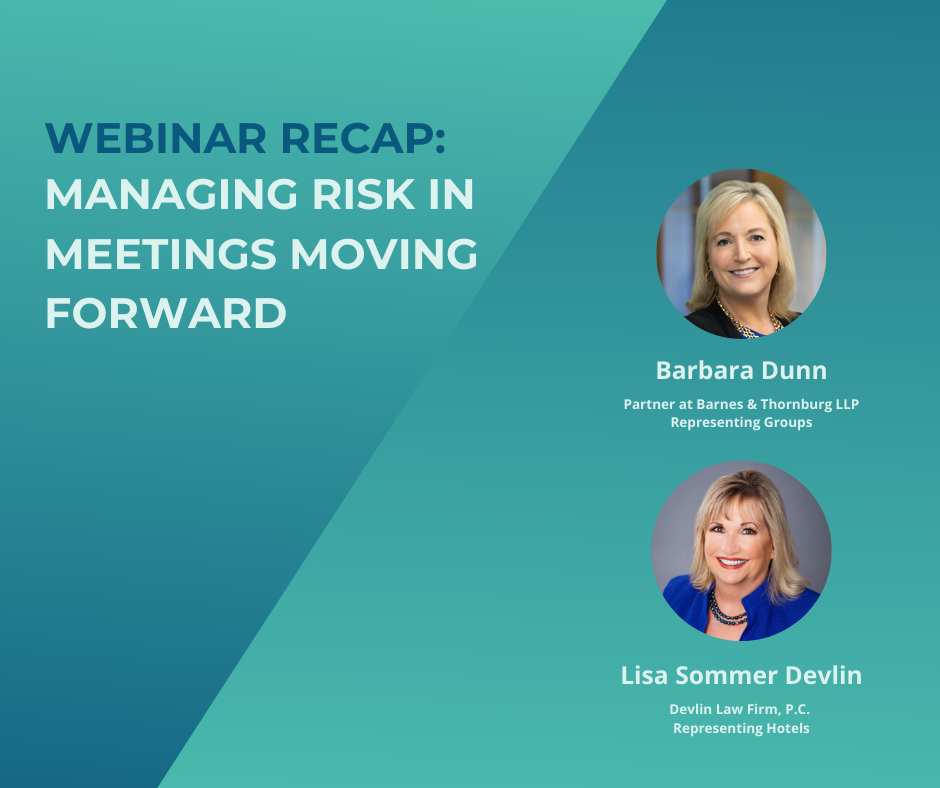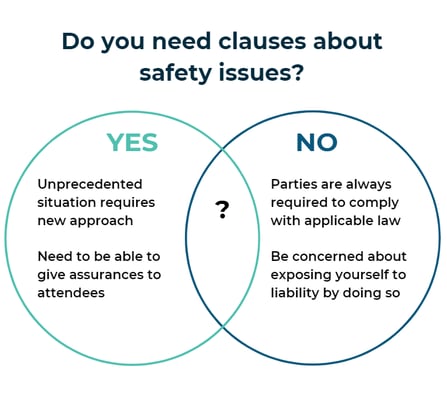5 Takeaways from the Risk Management in Mtg's Moving Forward Webinar
Recap of the webinar "Risk Management in Meetings Moving Forward" brought to you by HopSkip in partnership with Legalease with the Ladies

HopSkip in partnership with Legalease with the Ladies ™ recently released part two of our webinar series, where Barbara Dunn and Lisa Sommer Devlin provided an insightful conversation sharing insight around managing risk in meetings moving forward. Check out some of the main takeaways below.
Interested in accessing the full webinar content? Click here.
1) Issues to consider going forward:
Continue to pay close attention to limiting on public gatherings which we know varies state-by-state. We may see the physical distancing guidelines shift towards “recommendations” at a certain point so it’s important to stay close to the news.
One of the biggest challenges we will have going forward, whether you’re a planner, meeting sponsor or hotelier, will be trying to get compliance from all attendees. This will need to be discussed upfront with your hotel partner on who will be enforcing these requirements.
Both the planner and the hotelier should consider that it is acceptable to ask their partner for assurances of the ability to perform the meeting. You do not have to wait until the day of the event to express your concerns and are encouraged to have these conversations when you feel they are appropriate.
2) Waivers and assumption of risk:
Are they enforceable? The answer is maybe. There is a question right now about if a waiver of this type would be enforceable. However, here is where it gets muddy: whether or not pre-Injury waivers are enforceable varies widely state by state. Rarely are they enforced when it comes to a meeting or a “regular activity”.
On top of that, at the end of the day it will be difficult to prove where COVID-19 infections occurred, even if there were several people at the event that got sick. Also, it’s important to consider the “optics” of what a waiver represents to your attendees.
If you know going to a hotel meeting that there could be a risk of getting sick, that could mean that people who come to events could not be able to sue the hotel.
3) Do you need new contract clauses about safety issues?
Clauses about safety issues can be very helpful. Barbara’s approach would be to have placeholder type provisions to set the expectation and work together with your hotel partner to fill in the details. Lisa’s position is “No”. Parties are always required to comply with applicable law. Be concerned about exposing yourself to liability by doing so. If you are trying to set new safety standards you could end up exposing yourself to more liability.

4) Assuming a duty. Understand and agree well in advance of your meeting.
What does assuming a duty actually mean? If you take on responsibility for the safety of another and that other person is injured because you did not perform that responsibility correctly, you could be liable.
Taking necessary precautions are of course important but if every customer demands unique requirements for each meeting, it becomes difficult for hotels to operate meetings efficiently and the majority of properties will most likely resist.
Secondly, and most importantly, by making unique safety requirements in efforts to try and better protect your attendees and mitigate risk, you could be exposed to much more liability. If the planner didn’t request special requirements the liability would have most likely fallen with the hotel.
For example,
A planner requires the hotel to have a person on site who is trained in CPR. What happens if an attendee in the group needs CPR and the CPR provider is on the other side of the hotel and cannot arrive in time to provide CPR? The planner’s organization could risk getting sued on the grounds that there should have been adequate CPR staff in every meeting room of the hotel. The best way to avoid a risk is to make sure it doesn’t happen in the first place.
5) Solution: Contracts signed going forward
Will venues be flexible? In the short term the general consensus is yes, hotels will be flexible…..but for events in the summer of 2021- you might be pushing it.
One thing to be aware of, as hotels start to see an increase in RFP and contracting volume, contracts with loose commitments may result in cancellation.
How best to approach contracts with your hotel partner is to always, always, approach as a discussion, not a demand. Discuss practicalities and solutions—can you still host 900 people in the space available? But with business solutions - one size does not fit all, and they need to consider the hardships being faced by both parties.
We know these are new times for us all with new steps in the process so we’ve summarized a checklist to outline some of these recommendations to help you manage meetings moving forward
Checklist: Contracts Going Forward
-
Ask the venue upfront for its policies
-
Establish a “Code of Conduct” for your meeting (policies for how you will conduct your meeting)
-
Review the CDC/Department of Labor Guidelines
-
Confirm with your hotel partner situations for attendees who cannot attend due to vulnerable health circumstances
-
Agree and communicate about how to respond to attendees who do not comply with meeting guidelines
-
Confirm with your hotel partner how they will ensure their employees comply with the venue’s policies
Interested to learn more about how the HopSkip platform instills confidence in planners and hoteliers when sourcing groups and meetings? Feel free to schedule some time with us here.